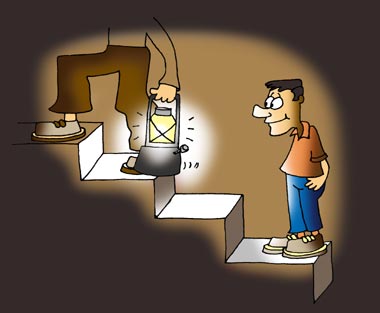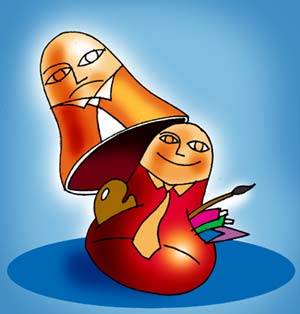 | « Back to article | Print this article |
Win Rs 25,000! Just solve this case
The Tata Consultancy Services-Smart Manager Case Contest is the oldest and most prestigious competition of its kind in India.
Apart from a one-year free subscription to The Smart Manager, India's first world-class management magazine, winners from the 'manager' and 'student' categories stand to win cash prises of Rs 25,000 each.
All you have to do is read the case, see the question you have to answer on the last slide, click on The Smart Manager logo below, and post your solutions by January 10, 2011. All the best!
Riya Pande looked up from the stack of papers before her and gazed out of the French windows in the conference room. She was waiting for her team to arrive for an emergency meeting.
Part of the core team at Nebula, she had been promoted twice and was due for another review in the next six months. An ambitious professional, Pande enjoyed the challenges that arose as the company expanded.
Founded in 2003, just before the retail boom, Nebula Hypermart had capitalised on its early mover advantage and expanded rapidly. In a span of four years, it had become one of the largest, most successful retail chains in the country.
A family-owned company, Nebula was now run by Mihir Bani, a management graduate from Stanford. Although Bani was relatively young, he was respected by all -- his employees, customers and competitors. In fact, many viewed him as a visionary, given Nebula's growth curve since he had taken control of the company in 2004.
Click NEXT to read on . . .
Win Rs 25,000! Just solve this case
All in all, it had been a smooth ride till the recession when customers started cutting back on their purchases, keeping a tight rein on their wallets, be it cash or credit. That was just the beginning of their problems.
At the time, they responded by trying out several new things. For starters, they introduced discounts on several products, especially those that were really fast moving. They organised training workshops for the customer-facing teams to help them effectively tackle the dwindling customer demand.
The sales team was offered special incentives to encourage them to come up with out-of-the-box ideas to step up consumer demand. They had even revisited their entire system of human resource management and introduced changes wherever necessary.
However, by then, the subprime crisis had grown into a full-blown recession, with its tentacles spread across the length and breadth of the globe. It looked as if footfalls at Nebula were never going to come back to its previous levels.
The problem progressed, embedding itself deeper and deeper, with dipping sales revenues, reduced sales incentives, dwindling numbers in customer facing teams and very low employee morale.
Something had to be done, and soon. Hence, today's emergency meeting. But what was the way ahead, the strategy to be employed?
Click NEXT to read on . . .
Win Rs 25,000! Just solve this case
Pande pulled herself out of her reverie, attempting to focus on what lay ahead. Should it be a cut in salaries? In any case, that would be better than ruthlessly retrenching staff.
Oblivious of all of this, her team had gone ahead with the cake cutting to celebrate the boss's anniversary. After all, Nebula had had a great innings thus far.
Human resource strategy
Building the team: Pande's first mandate as chief strategy officer had been to put together the management team.
Under her guidance, human resources drew up a list of veterans in the industry, tied up with niche head-hunters and hired the first batch of key personnel. The objective was to put in place an accomplished team who could get it right the first time.
Only people with prior retail experience were chosen. Most senior personnel came on board because they thought this was their big chance to create something new, unencumbered and fun. At the same time, they had their feet planted firmly on the ground. They knew that there is a world of difference between vision and reality.
Also, that success in the start-up phase was no guarantee of continued high performance, as was obvious from the many that had enjoyed early success only to come apart as they grew. Nebula first concentrated on major metros, later moving to Tier I/II cities.
Click NEXT to read on . . .
Win Rs 25,000! Just solve this case
The 'value wheel': While other companies shouted about their mission statements, the big guns at Nebula felt that these were like empty vessels: all noise and no substance.
Instead, they believed that values form the bedrock of an organisation -- its activities, policies and practices, decision making, management styles, et al. After much deliberation, they came to a consensus around seven core values: ethics, integrity, enthusiasm, entrepreneurial spirit, a world beater mindset, fun and innovation.
These would form the basis of all that Nebula stood for, the 'Value Wheel', the Holy Grail for all recruitments.
Recruitment, induction and training: The team paid strict attention to the recruitment process for each position that had to be filled. In order to ensure that the right people (whose core values were the same as Nebula's) got the job, candidates were asked questions with respect to their past behaviour.
Applicants were encouraged to recall incidents in previous assignments where they had enforced certain decisions and also to explain the consequences of their actions. Their answers were the key to whether they would uphold Nebula's values. There were multiple levels of interviews for the positions that needed to be filled.
Further, induction programmes were conceptualised keeping the various functions in mind. For instance, sales and customer facing teams had an almost two-week orientation.
Click NEXT to read on . . .
Win Rs 25,000! Just solve this case
Additionally, buddy programmes were introduced as part of the evaluation process where employee feedback was invited for the first ninety days.
Indeed, over the past two years, they had managed to rope in SAP HR, succeeding in getting all their HR systems automated.
Talent management: A robust performance management system tends to cut through the clutter of complex issues that threaten the success of modern retail, i.e. international sourcing, pressures on pricing, multi-channel operations, reduced predictability in the market, power of the Internet and complicated overseas markets.
Not surprisingly, Pande had, in the initial stages itself, introduced the popular system of Balanced Score Card.
Parameters evaluated included the ones typically reviewed as well as those that corresponded with the 'Value Wheel'. Challenging yet realistic objectives were set, and the first two years went off very well, with almost all employees falling within the Bell Curve.
However, come the third year and the mid-year review reflected a sorry state, with the Bell Curve largely skewed and over 60% of the employees not even meeting average expectations.
Click NEXT to read on . . .
Win Rs 25,000! Just solve this case
It was the same story with respect to compensation. They had started off benchmarking themselves with the best in the retail industry, subsequently introducing reimbursements to help employees save tax.
They had also modified their sales incentives to match the best in the industry. 'A-raters' were introduced to stocks. Plans for profit sharing had been in the pipeline, but the recession had put a spoke in the wheel. It was Bani who decided to withhold this measure.
"Congratulations and celebrations " once again Pande's daydreaming was interrupted by the chorus of voices. The cake cutting was over and it was time to get down to some hard facts. She threw a quick glance around the conference room to check if everyone was present.
Akhil Batra was there; he was tinkering away on his BlackBerry. He had about ten years' experience in the retail sector in the US when Nebula brought him over to India to start their new retail venture.
Once Batra was in India, he spent two years living out of a suitcase, traveling the length and breadth of the country, meeting channel partners, suppliers and farmers who had land to spare.
Ashok Venkatraman, head of operations, was engaged in a whisper session of sorts with Ram Kumar, head of finance. Yogesh Desai, head of retail sales; Ram Paranjape, head of quality; Sanjay Parekh, head of credit and collections and some senior HR team leaders were also present.
Click NEXT to read on . . .
Win Rs 25,000! Just solve this case
"They must be thinking that I have decided to throw in the towel," thought Pande. After all, this was the first emergency meeting she had called.
After a brief pause, she started, "I have called the team to discuss a pressing issue, which, if left to its own devices, is going to boomerang in our faces in the coming months. It is crucial that we all put on our thinking caps and zero in on a strategy to tide over this situation gracefully."
"As we all know, the recession has affected all business domains globally and we are definitely no exception to this. Retail giants such as Cesco and Tall Mart have started shutting down outlets, retrenching staff mercilessly. Sheer panic has stopped almost all retail chains in the US and European markets from making investments."
"Are you saying Riya that we too are contemplating shutting down outlets? Surely, we are not in such bad shape, or are we?" Venkatraman butted in.
"We all agreed to do some serious cost-cutting in our verticals and functions and, we have actually managed it. So now what is left to be done?" asked Paranjape.
"But the sales figures over the last two quarters tell a different story," Pande asserted.
Click NEXT to read on . . .
Win Rs 25,000! Just solve this case
All eyes turned toward Desai. Of late, his team seemed to be the target of gyaan by all and sundry. Then again, if it wasn't the sales team, it was the customer-facing team taking the flak.
"Are you saying that Sales is not delivering as per the agreed targets? If that's the case, why don't we just sack the existing team and recruit a new team?" Desai's voice was high-strung to say the least.
"It isn't fair to pin the problem on sales and customer-facing teams alone. We are all sailing in the same ship, so if the ship sinks, we all do," he continued in a high pitch."
"I have analyzed our output in the last four quarters, and there are a few things we need to do," Riya broke in. She didn't want one of those interdepartmental rows that had become the norm these days.
"We are just two years old; the first year was the project phase and the last one year has been a joyride. So far, the going has been good because consumers have been generous with their purse strings. Unfortunately now, they are tightening their belts, and we are feeling the pinch. However, my contention is that even in these tough times, we can win new customers and gain customer loyalty by focusing on those who aren't our best customers -- and by making sure we only offer what customers really value."
Click NEXT to read on . . .
Win Rs 25,000! Just solve this case
Finally, Pande had managed to grab ears. She continued with newfound confidence, "Hereon, we should apply five rules to gain market share:
1. We should focus on customers who are loyal neither to us nor our competitors.
2. We should seek to continually close the gap between customer needs and what we are offering currently.
3. We should attempt to reduce 'bad costs' costs that produce benefits that customers won't pay for.
4. We should form clusters of our stores based on similarity of customers' needs and purchase behaviors.
5. We should actively adopt retooling processes -- customer research, merchandise planning, performance management -- so as to better position Nebula to apply the first four rules.
Click NEXT to read on . . .
Win Rs 25,000! Just solve this case
"In addition, we should look at tying up with major retail chains across the country to have a common supply chain and warehouse for stocking goods."
"Unfortunately, most retailers don't work in this manner. Usually, they track the items that have been sold, the demand for these items and sometimes, they can even pin down the customers and the time of the purchase."
"And while this information leads to greater efficiency in inventory management and purchasing, it also allows retailers to stock up on what's selling well and pare down on what's not. This leads to a big gap between what the retailer is offering and what the customer really wants. We need to avoid falling into this trap if we are to get back our market share."
"However all these strategies can be implemented and will work only if our employee productivity is at an optimal level. The latest appraisal forms indicate a lack of focus and demoralisation amongst employees across teams."
Click NEXT to read on . . .
Win Rs 25,000! Just solve this case
"I would also like to add that the management is toying with the idea of suspending the distribution of incentives and pay raises till the economy improves and footfalls start increasing."
Your question
Given this situation, come up with strategies to boost employee morale and productivity in Nebula Hypermart's workforce.
Click on the logo below to submit your analysis. Or you may want to mail your analysis to casestudy@thesmartmanager.com (Note: Please check your email after registration for your username and password).










